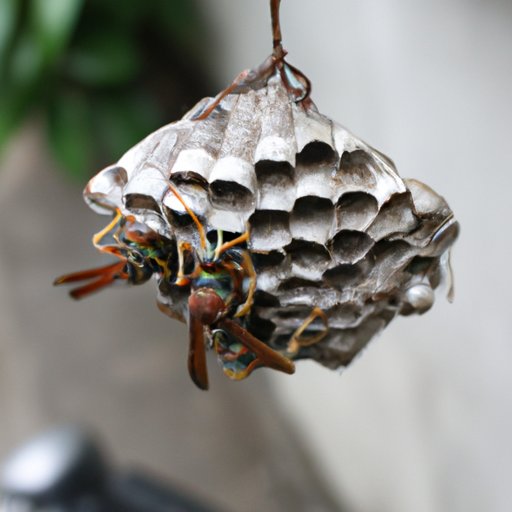
I. Introduction
Hornets nests can cause significant problems if they are not addressed. Not only can hornets cause painful stings, but they can also damage property and cause anxiety for those who are allergic to their venom. Therefore, finding ways to get rid of hornets nests is crucial. This article will explore the different methods available for hornets nest removal, including pesticides, removing the nest, trapping the hornets, using natural remedies, and seeking professional help.
II. Using Pesticides
Pesticides are a common way to control hornets. They work by releasing a toxic chemical that kills the hornets on contact. There are several types of pesticides available, including sprays, foams, and powders. When using pesticides, it’s essential to read the instructions carefully and follow safety precautions to minimize exposure to the toxic chemicals.
Most pesticide products are designed for outdoor use only, and it’s essential to use them in a well-ventilated area. Additionally, it’s crucial to wear protective clothing and equipment, such as gloves and a respirator mask, to prevent exposure to the chemicals. Some pesticide products may also require mixing with water, and it’s important to mix them appropriately to ensure their effectiveness.
The effectiveness of pesticides depends on the type of hornets and the size of the nest. In most cases, pesticides are effective in killing hornets, but they may not eliminate the entire colony. It’s important to follow up with additional treatments to ensure the complete extermination of the nest.
III. Removing the Nest
Removing the hornets’ nest is another effective way to get rid of hornets. It involves physically removing the nest to prevent the hornets from continuing to build and expand the colony. However, removing the nest can be dangerous and should only be attempted by those who have experience and proper safety gear.
To remove the hornets’ nest, you will need several tools, including a protective suit, gloves, hornet spray, a long pole, a trash bag, and duct tape. It’s recommended to remove the nest at night when the hornets are less active and less likely to sting. You should cover all parts of your body and wear protective gear to prevent any stings.
The effectiveness of removing the nest depends on the size of the colony. Removing the nest may not be effective if the colony is too large and has already built another nest nearby.
IV. Trapping the Hornets
Trapping hornets is another effective way to control their population. Traps work by luring the hornets in and trapping them, preventing them from reproducing and expanding their colony. There are several types of traps available, including bait traps and pheromone traps.
Bait traps work by using a liquid bait to attract the hornets. The traps should be placed away from human activity and in areas where there is minimal wind. Pheromone traps use female sex hormones to lure male hornets to the trap. These traps should be placed near the nest and monitored regularly.
Traps are effective in controlling the hornet population, but they may not eliminate the whole colony. It’s important to monitor the traps regularly and dispose of captured hornets appropriately.
V. Using Natural Remedies
Natural remedies are a safe and effective way to get rid of hornets without the use of toxic chemicals. Some natural remedies include spraying a mixture of vinegar and water, using essential oils like peppermint and eucalyptus, or creating a trap using a beer bottle and honey.
Using natural remedies requires patience and persistence, as it may take longer to notice a significant reduction in hornet activity. However, they are a safe and eco-friendly way to deal with hornet infestations.
VI. Seeking Professional Help
If all else fails, seeking professional help may be necessary to get rid of hornets. Pest control professionals have the experience and knowledge to deal with hornet infestations safely and effectively
When choosing a professional pest control service, it’s essential to choose a reputable company. Look for companies with good reviews and certifications from reputable organizations. The cost of hiring a professional varies depending on the level of infestation and the type of service required.
During the removal process, the pest control professional will assess the situation and choose the best method to get rid of the hornets. They will likely use a combination of pesticides, trapping, and removing the nest to ensure the complete extermination of the hornet colony.
VII. Conclusion
Hornets are a dangerous pest that can cause harm to humans and property. Fortunately, there are several ways to get rid of hornets, including using pesticides, removing the nest, trapping the hornets, using natural remedies, and seeking professional help. It’s important to choose the best method for your situation, follow safety guidelines, and take action to get rid of hornets safely and effectively.




